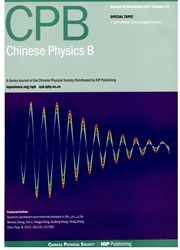Electronic cluster state entanglement concentration based on charge detection
- ISSN号:1674-1056
- 期刊名称:《中国物理B:英文版》
- 时间:0
- 分类:O413.1[理学—理论物理;理学—物理] S379.5[农业科学—农产品加工;农业科学—农艺学]
- 作者机构:[1]Key Laboratory of Broadband Wireless Communication and Sensor Network Technology, Nanjing University of Posts and Telecommunications, Ministry of Education, Nanjing 210003, China, [2]College of Mathematics & Physics, Nanjing University of Posts and Telecommunications, Nanjing 210003, China, [3]Institute of Signal Processing Transmission, Nanjing University of Posts and Telecommunications, Nanjing 210003, China
- 相关基金:Project supported by the National Natural Science Foundation of China (Grant Nos. 11104159 and 11347110), the University Natural Science Research Project of Jiangsu Province of China (Grant No. 13KJB140010), the Open Research Fund Program of National Laboratory of Solid State Microstructures, Nanjing University (Grant No. M25022), the Open Research Fund of Key Laboratory of Broadband Wireless Communication and Sensor Network Technology, Nanjing University of Posts and Telecommunications, Ministry of Education (Grant No. NYKL201303), and the Project Funded by the Priority Academic Program Development of Jiangsu Higher Education Institutions.
关键词:
电子自旋, 有效浓度, 检测器, 纠缠, 状态, 集群, 充电, 量子非破坏性测量, entanglement concentration, quantum computation, cluster states

中文摘要:
We propose an efficient entanglement concentration protocol(ECP)based on electron-spin cluster states assisted with single electrons.In the ECP,we adopt the electron polarization beam splitter(PBS)and the charge detector to construct the quantum nondemolition measurement.According to the result of the measurement of the charge detection,we can ultimately obtain the maximally entangled cluster states.Moreover,the discarded items can be reused in the next round to reach a high success probability.This ECP may be useful in current solid quantum computation.

英文摘要:
We propose an efficient entanglement concentration protocol (ECP) based on electron-spin cluster states assisted with single electrons. In the ECP, we adopt the electron polarization beam splitter (PBS) and the charge detector to construct the quantum nondemolition measurement. According to the result of the measurement of the charge detection, we can ultimately obtain the maximally entangled cluster states. Moreover, the discarded items can be reused in the next round to reach a high success probability. This ECP may be useful in current solid quantum computation.


 中文摘要:
中文摘要:
 英文摘要:
英文摘要:
 同期刊论文项目
同期刊论文项目
 同项目期刊论文
同项目期刊论文
 期刊信息
期刊信息
